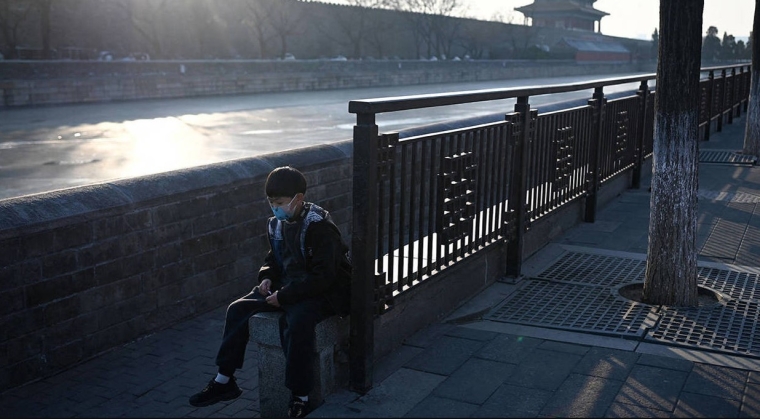
China’s high youth unemployment rate and increasingly disillusioned young people – many of whom are “giving up” on work – have attracted much attention from global media outlets and Chinese policymakers. The standard narrative is to associate the problem with the country’s recent growth slowdown. In fact, the issue goes much deeper.
The rise of youth depression has been decades in the making, and owes much to China’s rigid education system, past fertility policies, and tight migration restrictions. Chinese youth are burned out from spending their childhood and adolescence engaged in ceaseless, intense study. Attending a good university is seen as necessary for securing a good job; and for rural children, a university degree is the only path to legal residence in cities under the hukou registration system. In a city, average household annual disposable income is US$6,446, which enables a middle-class lifestyle. By contrast, in rural areas, an income averaging only US$2,533 means living in relative poverty.
As if the pressure to get into a university wasn’t bad enough, the rigid structure of the school system makes matters worse. After nine years of compulsory schooling, children must pass an exam to enter an academic high school, and only 50% of them are allowed to pass. Teenagers who don’t make the cut attend vocational high school and are destined for low-paying jobs.
Chinese children therefore begin studying in earnest very early in life. They not only go to school but also receive expensive outside tutoring and pursue extracurriculars like music or chess –which are rewarded in an opaque manner. In an attempt to alleviate some of these pressures, the government banned for-profit tutoring and barred public-school teachers from offering such services on the side. But this only added more pressure, because the price of tutors increased as their supply declined.
Wealthy households in Shanghai and Beijing now pay US$120 to $400 per hour for in-person tutoring, while the children of the non-wealthy must study even harder to make up for the tutoring that their parents can no longer afford. In the 1980s and 1990s, Chinese village and city streets were full of children. Today, one rarely sees any unless it is a holiday. Even on weekend afternoons, playgrounds are empty. The kids are all inside studying.
Another cause of youth depression is loneliness. Owing to the one-child policy, which lasted from 1979 to 2016, children in urban areas lack siblings. And unlike the first generation of single children after the policy was introduced, later generations do not even have cousins with whom to play (since their parents have no siblings, either). One survey of Chinese college students finds that the typical only child is much more likely to experience anxiety and depression than her classmates with siblings. Suicide rates for children between the ages of five and 14 have increased more than fivefold since 2010.
Parents are also under tremendous stress. In addition to taking care of their children, most middle-age urban couples also must care for four elderly parents. By contrast, in rural areas, where around 491 million Chinese live, the one-child policy was enforced less strictly, which means that adults often have siblings with whom to share the burden. But they face more stress when they have children. Many must seek higher-paid work in cities, but the hukou restrictions prevent them from bringing their offspring with them. Around 11% of Chinese today are rural-urban migrants, which translates into some 69 million children being left behind in rural areas.
Rural parents who might have been able to remain with their children have begun to face a different problem. Following the closure of around 300,000 rural schools between 2000 and 2015, 12% of primary-school-age children, and 50% of secondary schoolers, must attend often faraway boarding schools. Many rural adults thus work long hours to educate children with whom they must part after the first few years of life. Ironically, their chances of being reunited are even lower if their child ultimately succeeds, because most university graduates settle permanently in cities.
In 2018, 35% of Chinese adults reported being depressed on average. The rate was 50% higher in rural areas and among women. For obvious reasons, widespread depression is dangerous for any society, auguring future economic stagnation, low fertility, and other problems reminiscent of Japan starting in the 1990s.
The good news for China is that straightforward policy solutions are available. The first is to get rid of rigid, centrally planned schooling. Local governments ought to be able to decide how many schools to build and how many students to take, and each high school and university should decide who it wants to admit, including late bloomers who may have not been good test takers as kids. The government can still regulate schools, but it should delegate and decentralise most of the decision-making to increase the system’s flexibility. This alone would take a lot of pressure off young children and their parents.
A second step is to lift the rural-urban migration restrictions that are dividing families and condemning rural households to relative poverty. This solution has become especially important as aggregate growth has slowed. Rural areas cannot just wait their turn for the next run of growth. They need access to the same opportunities as urban households. Moreover, rural labour can boost productivity by filling low-skilled factory jobs. While college graduates struggle to find high-paying jobs, there are 30 million unfilled vacancies in manufacturing and assembly.
These policies are not without costs. Efforts to change the school system would trigger resistance from current stakeholders, and allowing free migration would increase urban congestion. But such measures would also yield clear benefits by boosting economic growth and improving the mental health of China’s young people and their parents.
Nancy Qian, Professor of Managerial Economics and Decision Sciences at Northwestern University’s Kellogg School of Management, is a co-director of Northwestern University’s Global Poverty Research Lab and the Founding Director of China Econ Lab. Copyright: Project Syndicate, 2023, published here with permission.
16 Comments
Where's Xing? China is a great place, huh?
It is a sad story, suppressing and disenfranchising millions and millions of China’s young. Maturing into adulthood without hope of improving your prospects will inevitably generate social hostility. The British for centuries dealt with that by sweeping the streets with press gangs and for soldiery off shore. The huge size of China by population and area is creating a huge pressure cooker it would seem. Powerful nations in the past have sought to relieve that by expansion.
Powerful nations in the past have sought to relieve that by expansion.
Which is why China is working on becoming Africa's best friend. Lots of brains and industriousness in China. Very low population density in Africa. Macau (China) has a population density of 21,000 per km2. Namibia has a population density of 3 per km2.
Will be interesting.
The africans will welcome them, but will eventually overthrough them as they are a different tribe.
Have you studied geography?
I could see this happening 10 years ago living there, it was obvious then. Meeting up with Chinese kids, especially teens, you could see they had serious mental health problems from never having had a decent childhood where they could express themselves or just play. It was perpetual study and focus. Problem was, they weren't even all that smart, they had the basics down really well, but its all rote learned. Try and get them to contrast 2 different ideas and tell you the plusses and minuses of each... they had/have no idea how to even start thinking about that sort of question. Ask them how a piece of poetry or music makes them feel and it was even more blank looks, waiting for you to give them the answer.
The result is adults that are often live in their own little world, rejection and rebellion, severe mental health issues, pampered and pandered to still by their aging parents, poor social and interpersonal skills plus not actually being that smart. However they have fantastic memories for facts and figures and can recite entire tomes of information at will.
childhood play is essential to human development. Watch out for 'structured learning', coming to a state school near you - how dare schools foster engaged learners, rote learning the basics is what counts!
In the early sixties Rewi Alley visited our home. Only remember parts of what he said but recall his view that the long history of the nation and the accompanying culture would not allow the people being subjugated to the point of losing their identities and freedom of thought. Don’t know if I have that quite right but it does look like en masse, the people generally have little scope to act as individuals, and that being the case, unfortunately you arrive at the dreadful, negative state of a society without any ideas.
Having taught many Chinese students at university, I concur with all you have said
"children of the non-wealthy must study even harder to make up for the tutoring that their parents can no longer afford." Mao must be turning in his grave.
Yes it’s an injustice that would be unimaginable to those that were in power at that time.
Indeed, Mao did many great things in his time, particularly during the start of his tenure, less so towards the end. Possibly his best policy was to make sure everyone studied or had the oppourtunity to from a young age, using a standard and pretty good curriculum. Its what really saw to China succeeding as by the time the 70s and 80s rolled around, China had a population of pretty smart people, hence industrialisation was achievable and as they opened to the world, made them very competitive.
Lol economists solutions to human wellbeing issues - send them to the mines.
Those links to the factory jobs aren't exactly encouraging.
The most useful people I know have had a good trade training, including things like nursing, and commonly now doing something else.
Maybe this is why they tried to ban the music from les miserables
Thanks Nancy, this is very sad and I really feel for these young people. Especially the child suicide rates. We know that play, which includes large movement of arms and legs, is very important to brain development in young people. So these children's (lack of) brain development from play isn't going to mature into the ability to make good decisions from a developed prefrontal cortex at 25. I also really feel for the children who have learning disabilities or are really creative, in a system that doesn't allow for neurodivergence.

We welcome your comments below. If you are not already registered, please register to comment
Remember we welcome robust, respectful and insightful debate. We don't welcome abusive or defamatory comments and will de-register those repeatedly making such comments. Our current comment policy is here.